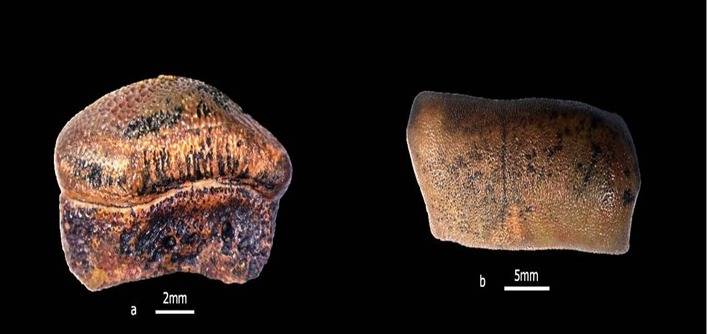The newly discovered crushing teeth in Jaisalmer represent a new species named by the research team as ‘Strophodusjaisalmerensis’…reports Asian Lite News.
In a rare discovery, the teeth of a new species of hybodont shark of the Jurassic era have been reported found for the first time in Jaisalmer by a team comprising of Krishna Kumar, Pragya Pandey, Triparna Ghosh and Debasish Bhattacharya from the Geological Survey of India (GSI), Western Region, Jaipur.
This finding has been published in Historical Biology, a Journal of Palaeontology, in its August, 2021, 4th issue. Prof Sunil Bajpai, heading the department of earth sciences, Indian Institute of Technology, Roorkee, who is a co-author of this publication, played a significant role in the identification and documentation of this discovery.
According to Krishna Kumar, senior geologist, palaeontology division, Western Region, “Hybodont sharks have been reported for the first time from the Jurassic rocks (approximately, between 160 and 168 million years old) in the Jaisalmer region of Rajasthan. They comprise an extinct group of sharks, which was a dominant group of fishes in both marine and fluvial environments during the Triassic and early Jurassic time. However, hybodont sharks started to decline in marine environments from the Middle Jurassic onwards until they formed a relatively minor component of open-marine shark assemblages. Hybodonts finally became extinct at the end of the Cretaceous period 65 million years ago.”
The newly discovered crushing teeth in Jaisalmer represent a new species named by the research team as ‘Strophodusjaisalmerensis’. The genus Strophodus has been identified for the first time in the Indian sub-continent and is only the third such record from Asia, the other two being from Japan and Thailand. This species has recently been included in the Shark references.com, an international platform operating in association with International Union for Conservation of Nature (IUCN), Species Survival Commission (SSC), and Germany.
This discovery marks an important milestone in the study of Jurassic vertebrate fossils in the Jaisalmer region of Rajasthan, and it opens a new window for further research in the domain of vertebrate fossils.
ALSO READ-Geo-Tourism In India
READ MORE-SCARY…! Dinosaurs Storm Eden Project









